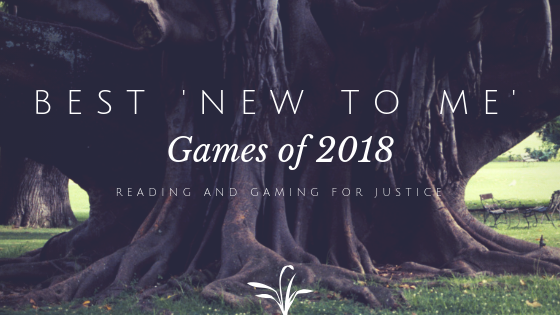
It is about that time – time to reflect on the year, remember all that we have done, and find the highlights and lowlights of the year. Reflection is a key piece of learning, growing, and solidifying memories. Taking time to reflect on the best gaming experience of 2018 helps me think about my participation in the board game hobby, the places I want to continue to amplify, and the places where I want to see change. Thinking about games specifically – which games were my favorite during the year – is simply an easy starting point for reflection. I plan to write a bit more about my actual experiences with people, but for now without further delay, the best games I played that were new to me in 2018.
Gaia Project designed by Jens Drögemüller and Helge Ostertag
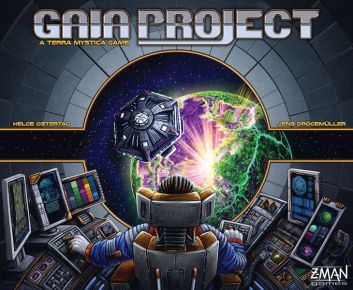
I never played Terra Mystica even though I have been interested in the game for awhile now. Maybe it was the (unintended) intimidation by the folks who do really enjoy the game, and I stayed away because of the massive complexity. But in reality, I think I just never took the time or sought it out and found a friend willing to teach me. I was at a gamely, quite recently, where Gaia Project was suggested as a game to play in the evening. I knew it was a long game and one I would have to learn the intricacies of… but I thought to myself, if not now, then when? And I took the plunge. While there are a lot of rules and things you can do in the game, one aspect I noticed was everything made sense and there was a nice clear player aid reminding me of all the actions. I really enjoyed my first play of Gaia Project. While I got trounced by a good amount of points, I felt I really learned the game and the unique mechanisms players must manage in order to do well. I was the Bescods – which are a bunch of tech robots whose special power was to upgrade tech. I did not really follow their special ability because I was exploring the different aspects. What really enamored me was the management of power and how different cycle strategies came into play depending on what I wanted to do. Gaia Project made this list because I am looking forward to playing it again and seeing the depth of startegy that it contains.
Pups designed by Charlie Bink
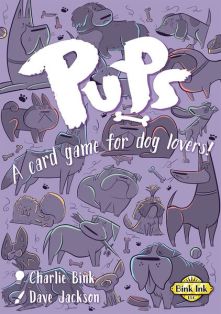
Of course a trick-taking game was going to make my list. I played a couple of new to me trick-takers this year, but the stand out is Pups! Besides the adorable theme, Pups is a pretty standard trick-taking game where players, after viewing their hand, tries to predict how many tricks they will take in the round. Once they determine how many tricks they think they will take, they take the appropriate card which states their bet. Each card has to different bets – an exact bet and an at least bet. As a player I can either predict I will take exactly 2 tricks or, if I am not feeling that confident with my hand, predict I will take at least 2 tricks. However, the exactly bets pay out more points if a player is able to achieve it. The hand is played as a normal trick-taking game, where the leader of the trick plays a card and the other players must follow suit if possible. If not, players can choose any off suit card to play. Highest card in the lead suit or highest trump card wins the trick and leads the next trick. When all cards are played, players will see if they made their bet. If they did, they get positive points, symbolized by bones. If not, players receive negative points, symbolized by dog poop. After a certain number of rounds, the player with the highest score wins.
Sidereal Confluence designed by TauCeti Deichmann
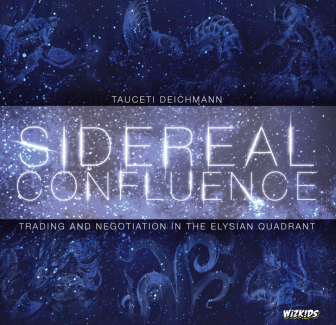
Negotiation. Open and free negotiation games are hit or miss for me depending on my mood when entering the game. Social dynamics and effective evaluation of assets impact each negotiation in different ways, despite the simple rulesets that often accompany them. Sidereal Confluence takes that simple idea of open negotiation and layers asymmetrical player powers, goals, and experiences, to create a more complex but in my opinion rewarding experience. The game is played in basically three phases – the first is open negotiation where you can literally trade whatever (planets, resources, victory points, future deals, etc.). The second phase is using your personal resources and planets to convert to other resources and score victory point. It is really in this phase very players utilize their different strengths – for example, one race loves obtaining planets and then destroying them to gain a ton of resources one time. They want to trade for cheap planets that are not very useful for their opponents. The third phase is an auction for new planets, followed by cleanup. If you like negotiation, you ned to try this game!
Spaceteam designed by Tim Hutchings and Mathew Sisson
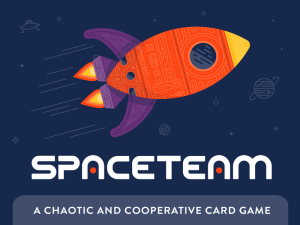
I remember playing the Spaceteam app about three years ago and thought it was an innovative, fun, and chaotic experience with friends. Since that experience, I had not thought about Space Team in a very long time… until I was at a game night over at a friend’s house and they suggested we play. I immediately thought of the app, but they pulled out a card game. In the card game, players are cooperatively trying to fix their spaceship so it can successfully launch. Each player starts with a hand of tool cards and a pile of problems and anomalies. To fix the ship, the players need to deal a number of problems with the ship with different tools – most of the time the player needing to fix a specific problem will not have the tools needed to do it. They must communicate (shout) at the other players the tools they need until the tool is passed to them and they can commit it to fixing the problem. But the tools are not named like any tools we know – so you will be shouting “I need the Y-Throstle.” or “I need to one shaped like a french horn!” Every so often, something will pop up that impacts a player or all players… for example, the “I’m a Robot” card makes the player who gets it play the rest of the round without the use of their thumbs. This all happens in a chaotic 5 minutes. If the players manage to find all the ship cards, they win!
Twin Stars: Adventure Series I designed by Mike Mullins and Jason Tagmire
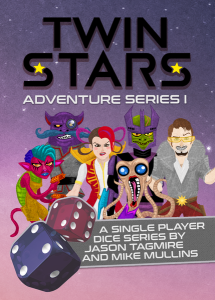
I really enjoy solo gaming but most of the solo games I own take a good effort to set up and play. Twin Stars is a solo game where you literally need three cards, a handful of tokens, and two dice. And trust me, there is a compelling game here! Adventure Series I comes with a handful of characters and different scenarios which will change up your experience – simply pick a scenario and two characters and you are ready to go! The main mechanism is rolling the two dice, assigning them to you characters, and resolving any effects or using any actions. The effects depend on what characters you are using and of course, the special rules and goals of the scenario. Once the dice are resolved, you roll again. The brilliance of such a simple system is the ways you must decide to have a negative thing happen in order to set up the dice to make progress towards your goal. If you are relying on the rolls exclusively, you will most likely lose the game. I really enjoy Twin Stars for a quick solo game and I am looking forward to Series II.
Yokohama designed by Hisashi Hayashi
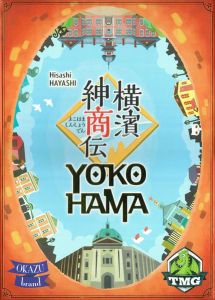
I enjoyed and still do enjoy Istanbul, which introduced me to the idea of worker movement and drop off. Yokohama takes that mechanism to the next level for me. From famed Japanese designer, Hisashi Hayashi, this resource management game is set in the port of Yokohama where players are collecting different goods and building different types of industry around the port. To do so, players are moving their worker to adjacent tiles and dropping off auxiliary workers before moving on. With more workers present on a single tile, the better the action will be. Further, having more workers on the board will create a larger network, allowing the player to move with more ease. This game is thinky – trying to figure out what you need to do and what path to take across the board – but has a real intuitive nature to the gameplay. Because of those two qualities, Yokohama has risen to the top for me this year.
What were your favorite new to you games of 2018?
Guest blogging, and blogging in general is the most wonderful thing.
Particularly with all the bull that seems end up being floating around in IM forums, blogs and world-wide-web websites.
And very much like in real-world sometimes they succeed. http://www.anglisticum.org.mk/index.php/IJLLIS/comment/view/1718/0/9445
LikeLike
Posted by triple ace stv 333 bsnl plan | December 25, 2018, 1:59 PM